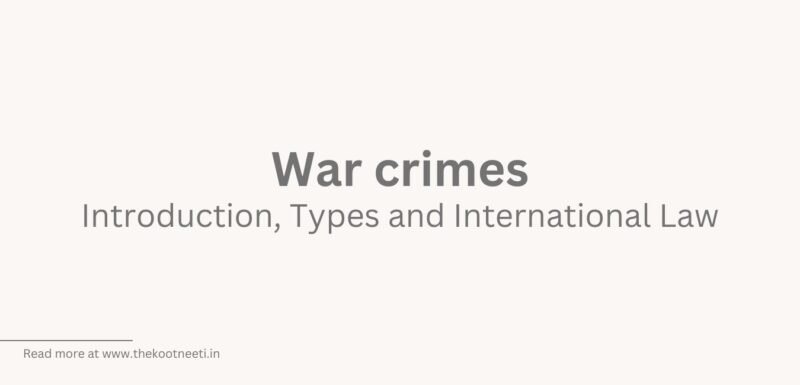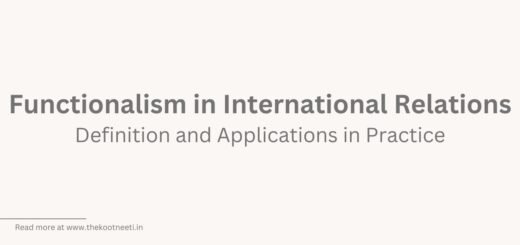War crimes: Introduction, Types and International Law

A war crime is a criminal act that is committed during an armed conflict. War crimes can be committed by individuals or groups, and can be perpetrated by any party to a conflict, including governments, armed groups, and civilians.
The laws of war, also known as international humanitarian law, are a set of rules that seek to protect civilians and other non-combatants from harm during armed conflict. These laws also seek to limit the means and methods of warfare that can be used, in order to minimize suffering and to prevent unnecessary harm. War crimes are actions that violate these laws and are therefore considered serious crimes under international law.
Examples of war crimes include killing or injuring civilians or captured military personnel, torture, rape, and other forms of sexual violence, using prohibited weapons or tactics, and intentionally attacking hospitals or other protected buildings or infrastructure.
The International Criminal Court (ICC) and other international and national courts have the authority to prosecute individuals for war crimes. The ICC was established to hold individuals accountable for the most serious international crimes, including war crimes, crimes against humanity, and genocide.
Type of War Crimes
War crimes are serious violations of international humanitarian law (IHL) that occur during an armed conflict. There are several types of war crimes, including:
- Murder: War crimes involving the murder of prisoners of war, civilians, or other persons who are no longer taking part in the hostilities.
- Torture: War crimes involving the intentional causing of severe physical or mental pain or suffering to persons who are in the power of an opposing party.
- Rape and sexual violence: War crimes involving sexual violence, including rape, sexual slavery, and forced pregnancy.
- Deportation and forced displacement: War crimes involving the forced displacement of a civilian population, including the forced evacuation of a town or area.
- Inhumane treatment: War crimes involve the inhumane treatment of prisoners of war, civilians, or other persons who are in the power of an opposing party. This can include things like starvation, exposure to the elements, and medical experimentation.
- Attacking civilian objects: War crimes involve attacking civilian objects that are not being used for military purposes, such as homes, schools, and hospitals.
- Using prohibited weapons: War crimes that involve the use of weapons that are prohibited by international law, such as chemical, biological, and nuclear weapons.
- Taking hostages: War crimes that involve taking hostages or using human shields.
- Collective punishment: War crimes that involve punishing an entire population or group of people for the actions of a few individuals.
Using protected persons and objects: War crimes that involve using protected persons, such as prisoners of war, or protected objects, such as cultural heritage sites, in order to shield military operations or to attack an opposing force.
International Law for War Crimes
International law provides a framework for the prosecution of war crimes. War crimes are serious violations of international humanitarian law (IHL), which is a body of laws that seek to protect persons who are not or are no longer taking part in hostilities.
The main treaty that governs the prosecution of war crimes is the Rome Statute of the International Criminal Court (ICC). The ICC is an international tribunal with the authority to prosecute individuals for war crimes, genocide, and crimes against humanity. The ICC can only exercise jurisdiction over individuals if a state is unable or unwilling to do so, and the Court can only hear cases referred to it by a State Party or the United Nations Security Council.
In addition to the ICC, there are other international and national mechanisms that can be used to prosecute war crimes. For example, the International Criminal Tribunal for the former Yugoslavia (ICTY) and the International Criminal Tribunal for Rwanda (ICTR) were both established by the United Nations Security Council to prosecute war crimes committed during the Yugoslav Wars and the Rwandan genocide, respectively. Similarly, national courts can also prosecute war crimes under the principle of universal jurisdiction, which allows states to assert jurisdiction over certain serious international crimes regardless of where they were committed or the nationality of the perpetrator or victim.
Under international law, individuals can be held criminally responsible for war crimes if they order, assist, or commit such crimes. Commanders and civilian leaders can be held liable for war crimes committed by their subordinates if they knew or should have known about the crimes and failed to prevent or punish them. This principle is known as command responsibility.
It’s important to note that these laws and international courts have jurisdiction only over states that accepted the ICC statute, and some countries haven’t accepted the jurisdiction of the ICC. And that prosecution and accountability for war crimes can be complicated by the political realities of a conflict or by the unwillingness of some countries to prosecute or surrender suspects.



















